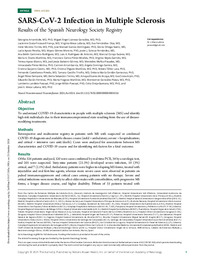Título :
SARS-CoV-2 Infection in Multiple Sclerosis. Results of the Spanish Neurology Society Registry |
Autor :
Arrambide, Georgina
Llaneza-González, Miguel Ángel
Costa-Frossard França, Lucienne 
Meca-Lallana, Virginia 
Fernández- Díaz, Eva
Moreno Torres, Irene 
García-Domínguez, Jose Manuel
Ortega Suero, Gloria 
Ayuso-Peralta, Lucia 
Gomez-Moreno, Mayra 
Sotoca-Fernández, Javier J.
Caminero-Rodríguez, Ana Belén
Rodríguez de Antonio, Luis A.
Corujo-Suárez, Marcial
Otano-Martínez, María A.
Pérez-Miralles, Francisco Carlos
Reyes-Garrido, Virginia
Ayuso-Blanco, Teresa
Balseiro-Gómez, José Jesús
Muñoz Pasadas, Mercedes 
Pérez-Molina, Inmaculada
Arnal-García, Carmen
Domingo-Santos, Angela
Guijarro-Castro, Cristina 
Íñiguez-Martínez, Cristina
Téllez Lara, Nieves
Castellanos Pinedo, Fernando 
Castillo-Trivino, Tamara 
Cerdán-Santacruz, Debora María
Perez-Sempere, Angel 
Sebastián Torres, Berta
Álvarez de Arcaya, Amaya
Costa-Arpín, Eva
Durán-Ferreras, Eduardo
Fragoso-Martínez, Marta
González Platas, Montserrat 
Landete, Lamberto 
Millán-Pascual, Jorge
Oreja-Guevara, Celia
MECA-LALLANA, JOSE EUSTASIO  |
Editor :
Wolters Kluwer Health/Lippincott Williams & Wilkins |
Departamento:
Departamentos de la UMH::Medicina Clínica |
Fecha de publicación:
2021 |
URI :
https://hdl.handle.net/11000/33767 |
Resumen :
Objective
To understand COVID-19 characteristics in people with multiple sclerosis (MS) and identify
high-risk individuals due to their immunocompromised state resulting from the use of diseasemodifying
treatments.
Methods
Retrospective and multicenter registry in patients with MS with suspected or confirmed COVID-19 diagnosis and available disease course (mild = ambulatory; severe = hospitalization; and critical = intensive care unit/death). Cases were analyzed for associations between MS characteristics and COVID-19 course and for identifying risk factors for a fatal outcome.
Results
Of the 326 patients analyzed, 120 were cases confirmed by real-time PCR, 34 by a serologic test, and 205 were suspected. Sixty-nine patients (21.3%) developed severe infection, 10 (3%) critical, and 7 (2.1%) died. Ambulatory patients were higher in relapsing MS forms, treated with injectables and oral first-line agents, whereas more severe cases were observed in patients on pulsed immunosuppressors and critical cases among patients with no therapy. Severe and critical infections were more likely to affect older males with comorbidities, with progressive MS forms, a longer disease course, and higher disability. Fifteen of 33 patients treated with rituximab were hospitalized. Four deceased patients have progressive MS, 5 were not receiving MS therapy, and 2 were treated (natalizumab and rituximab). Multivariate analysis showed age (OR 1.09, 95% CI, 1.04–1.17) as the only independent risk factor for a fatal outcome.
Conclusions
This study has not demonstrated the presumed critical role of MS therapy in the course of COVID-19 but evidenced that people with MS with advanced age and disease, in progressive course, and those who are more disabled have a higher probability of severe and even fatal disease.
|
Palabras clave/Materias:
Esclerosis múltiple
COVID-19 |
Área de conocimiento :
CDU: Ciencias aplicadas: Medicina |
Tipo de documento :
info:eu-repo/semantics/article |
Derechos de acceso:
info:eu-repo/semantics/openAccess |
DOI :
https://doi.org/10.1212/NXI.0000000000001024 |
Publicado en:
Neurol Neuroimmunol Neuroinflamm 2021;8:e1024 |
Aparece en las colecciones:
Artículos Medicina Clínica
|
 La licencia se describe como: Atribución-NonComercial-NoDerivada 4.0 Internacional.
La licencia se describe como: Atribución-NonComercial-NoDerivada 4.0 Internacional.
.png)
